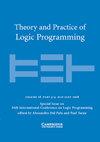使ProB与sw - prolog兼容
IF 1.1
2区 数学
Q3 COMPUTER SCIENCE, SOFTWARE ENGINEERING
引用次数: 2
摘要
摘要尽管Prolog编程语言的核心自1995年以来已被ISO标准化,但编写复杂的Prolog程序仍然很困难,这些程序可以在多个Prolog实现上不加修改地运行。事实上,实现有时会偏离ISO标准,并且标准本身未能涵盖实践中必不可少的许多功能。因此,大多数Prolog应用程序不得不依赖非标准特性,这往往使它们依赖于一个特定的Prolog实现,并且与其他实现不兼容。我们研究了一个这样的Prolog应用程序:ProB,它已经在SICStus Prolog中开发了20多年。本文描述了我们如何重构ProB的代码库,以支持SWI-Prolog,目的是使用两个独立的工具链验证ProB的结果。这需要大量的调整,从扩展SWI-Prolog中的SICStus仿真到更好地模块化单片ProB代码库。我们还描述了在这个过程中遇到的显著兼容性问题和其他差异,以及我们如何能够在几乎没有重大代码更改的情况下处理这些问题。本文章由计算机程序翻译,如有差异,请以英文原文为准。
Making ProB Compatible with SWI-Prolog
Abstract Even though the core of the Prolog programming language has been standardized by ISO since 1995, it remains difficult to write complex Prolog programs that can run unmodified on multiple Prolog implementations. Indeed, implementations sometimes deviate from the ISO standard and the standard itself fails to cover many features that are essential in practice. Most Prolog applications thus have to rely on nonstandard features, often making them dependent on one particular Prolog implementation and incompatible with others. We examine one such Prolog application: ProB, which has been developed for over 20 years in SICStus Prolog. The article describes how we managed to refactor the codebase of ProB to also support SWI-Prolog, with the goal of verifying ProB’s results using two independent toolchains. This required a multitude of adjustments, ranging from extending the SICStus emulation in SWI-Prolog on to better modularizing the monolithic ProB codebase. We also describe notable compatibility issues and other differences that we encountered in the process, and how we were able to deal with them with few major code changes.
求助全文
通过发布文献求助,成功后即可免费获取论文全文。
去求助
来源期刊

Theory and Practice of Logic Programming
工程技术-计算机:理论方法
CiteScore
4.50
自引率
21.40%
发文量
40
审稿时长
>12 weeks
期刊介绍:
Theory and Practice of Logic Programming emphasises both the theory and practice of logic programming. Logic programming applies to all areas of artificial intelligence and computer science and is fundamental to them. Among the topics covered are AI applications that use logic programming, logic programming methodologies, specification, analysis and verification of systems, inductive logic programming, multi-relational data mining, natural language processing, knowledge representation, non-monotonic reasoning, semantic web reasoning, databases, implementations and architectures and constraint logic programming.
 求助内容:
求助内容: 应助结果提醒方式:
应助结果提醒方式:


